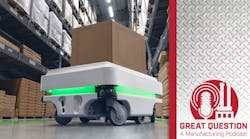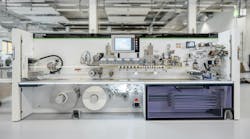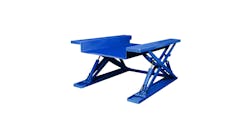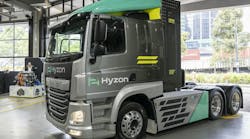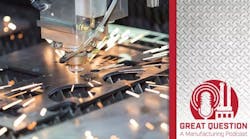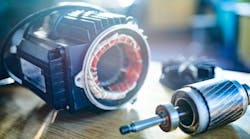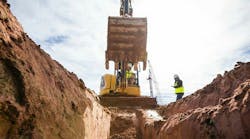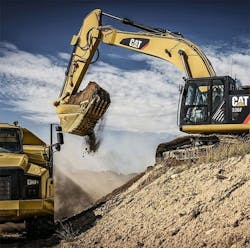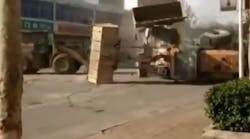Authors:
One week ago, Caterpillar Inc. was being praised by President Donald Trump for producing great bulldozers. “I love Caterpillar," Trump told company Chairman Doug Oberhelman at a meeting of manufacturing heads at the White House.
On Thursday, officials from the Commerce Department, Internal Revenue Service, Federal Deposit Insurance Corp. and Illinois State Police moved in and out of the company’s corporate headquarters in Peoria, Illinois, in a raid seeking evidence related to exports and a Swiss subsidiary as part of a criminal probe.
Bloomberg News obtained copies of three related search warrants, signed Feb. 24 by U.S. Judge Harold Baker, that authorized seizure of a broad range of documents and electronic files related to Caterpillar’s Swiss affiliate, CSARL. Authorities, the warrants said, sought evidence related to potential crimes, including “failure to file or submitting false electronic export information” and “false and misleading financial reports and statements.”
Caterpillar shares fell after the raid, losing 4.3% to $94.36 in New York on Thursday, the biggest decline since June. The maker of mining and construction equipment had been soaring since Trump’s election, buoyed by the promise of $1 trillion in U.S. infrastructure spending. A swelling market for machinery is just what the company needed, after hitting a slowdown in demand that came on the heels of billions of dollars of overseas acquisitions.
Photo: Caterpillar Inc./ Instagram
The shares were up 1.3% at 9:47 a.m. in New York Friday as analysts at Jefferies and Wells Fargo said the case probably wouldn’t hurt longer term earnings prospects.
The massive search Thursday included corporate headquarters as well as an office in East Peoria and a facility in Morton, Illinois, that receives and ships replacement parts to dealers globally. It comes just months after Oberhelman stepped aside as chief executive officer, leaving operations in the hands of company veteran Jim Umpleby.
Caterpillar, which traces its roots back 125 years, has long fought government allegations that it owed taxes on profits from parts shipments involving its Caterpillar SARL unit, which is based in Geneva. In a filing last month, Caterpillar said it is “vigorously contesting the proposed increases to tax and penalties” of about $2 billion.
“While the warrant is broadly drafted, we believe the execution of this search warrant is regarding, among other things, export filings that relate to the CSARL matter,” Caterpillar said in a statement. The company, which has a financial unit that lends to customers, said it was cooperating with the investigation.
Warrants
Authorities sought data about products moving between the U.S. and Switzerland and/or CSARL, sales outside the U.S., and end users of exported items.
The warrants, which are under court seal, suggested other nefarious conduct. They sought data on “export controls in the United States and other countries, use of aliases, and efforts to thwart or avoid law enforcement scrutiny.”
They also were looking for names of people who may have been contacted about “export offenses,” and they wanted “counter forensic programs” designed to eliminate data.
Under a Microscope
“The timing is surprising but there have been publicly stated concerns in the past, and it could be potentially related to that,” said Sameer Rathod an analyst with Macquarie Capital (USA) Inc. Caterpillar’s “transfer pricing accounting was under a microscope and we haven’t really heard anything on these for a long time.”
Still unclear is why the FDIC -- which insures deposits and supervises financial institutions “for safety and soundness and consumer protection,” according to its website -- was part of the raid.
“We believe the FDIC being there suggests it’s not as clear cut as Caterpillar and some of our peers are suggesting,” Gordon Johnson, an analyst at Axiom Capital Management, said in a telephone interview. “When the feds raid your office, they’re not going to tell you why they’re raiding your office. They tell you to get your hands off the computer and leave the building.”
A spokesman for the FDIC declined to comment on Thursday’s raids. Justin Cole, a spokesman for the IRS Criminal Investigation division, confirmed that its agents were on-site, without elaborating. A voice mail seeking comment from the Commerce Department late Thursday wasn’t immediately returned.
The company acknowledged in its 2016 annual filing that it received a grand jury subpoena from the U.S. District Court for the Central District of Illinois in January 2015. That subpoena requested documents relating to, among other things, financial information on U.S. and non-U.S. Caterpillar subsidiaries. It included undistributed profits of non-U.S. subsidiaries and the movement of cash among U.S. and non-U.S. subsidiaries.
Parts Resale
The manufacturer said it got additional subpoenas relating to this investigation requesting more information on the purchase and resale of replacement parts by Caterpillar and non-U.S. Caterpillar subsidiaries, as well as dividend distributions of certain non-U.S. Caterpillar subsidiaries. The company said in the filing that it believes this matter “will not have a material adverse effect on the company’s consolidated results of operations, financial position or liquidity.” In a 2009 whistle-blower lawsuit, a former Caterpillar executive accused the company of using offshore subsidiaries in Switzerland and Bermuda to avoid about $2 billion in U.S. taxes from 2000 to 2009. The company sold and shipped spare parts globally from Illinois while improperly attributing at least $5.6 billion of profit from those sales to a unit in Geneva, according to claims made in that lawsuit, which was settled in 2012.
Within the Law
In 2014, the U.S. Senate’s Permanent Subcommittee on Investigations followed up on the executive’s claims and found that Caterpillar had “shifted billions of dollars in profits away from the United States and into Switzerland.” In Switzerland, Caterpillar had an effective corporate tax rate of 4% to 6%, the panel found -- far less than the 35% U.S. corporate income tax rate. Caterpillar told the Senate panel that it had fully complied with U.S. tax law.“We believe the relevant transactions complied with applicable tax laws and did not violate judicial doctrines,” Caterpillar said in the disclosure.
Stephen Volkmann, an analyst at Jefferies, said in a note to clients that if the latest inquiry is related to taxes, any settlement would probably be far in the future and mostly one time. He said the issue shouldn’t change investors’ views of the company’s earnings power over the next couple years.
Back in Peoria, investigators executing the raid funneled in an out of Caterpillar’s headquarters late on Thursday, while no employees were seen entering or exiting the premises. One man in an IRS jacket joked to reporters that at least it was a nice day outside. By late afternoon, it was clear the raid was going to last a while -- pizzas were being delivered for law enforcement officials inside the company’s headquarters.
